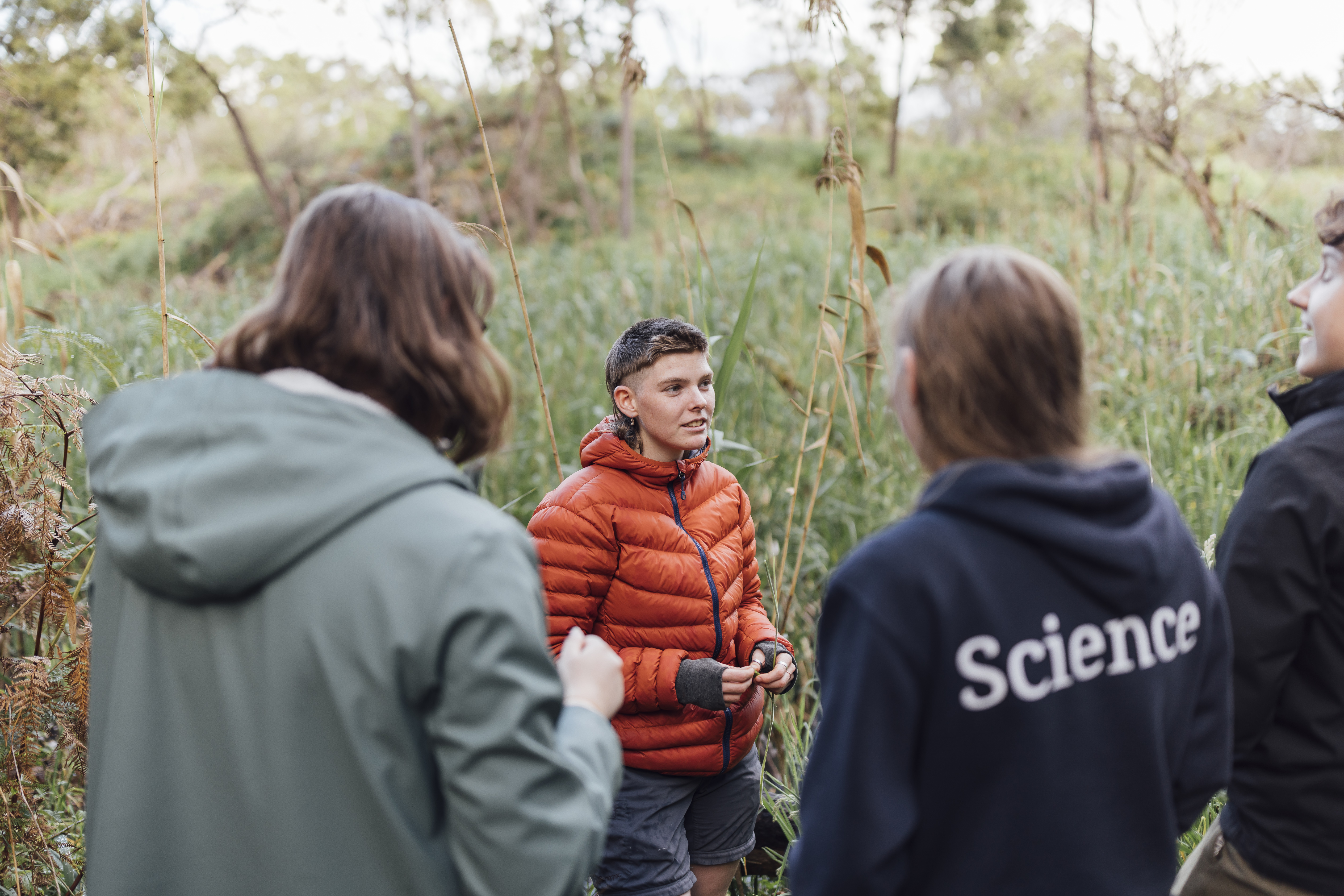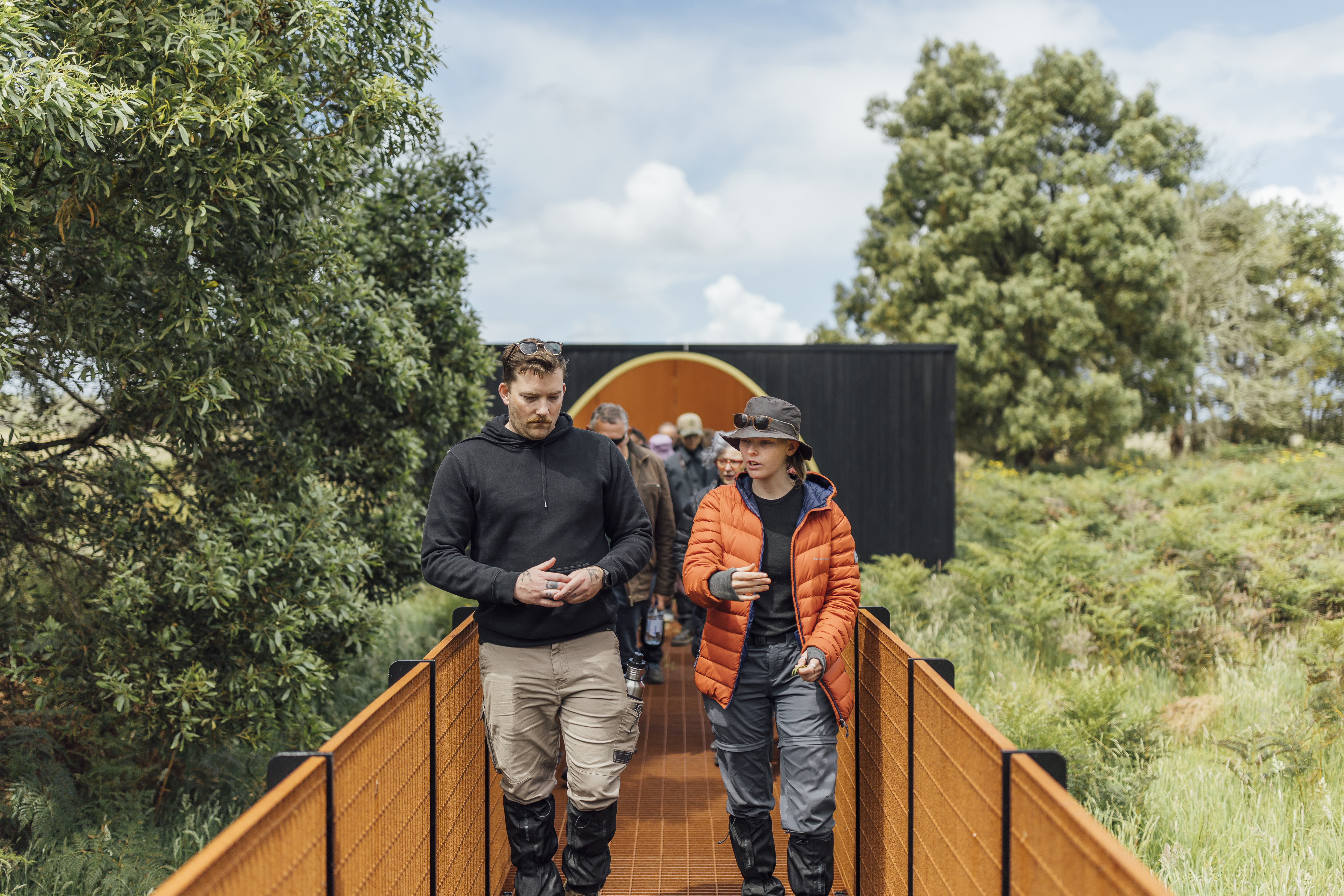The Budj Bim On-Country Learning and Research project redefined Science student Arky's understanding of engineering, and opened her eyes to a new way of seeing the world.
Last year, University of Melbourne students from a number of different faculties attended the Budj Bim On-Country Learning and Research project, a truly unique, two-way learning experience focused on building meaningful relationships and connection between Traditional Owners—the Gunditjmara people—and the University of Melbourne. It’s a program that redefines what it means to be an engineer, exposing students to Indigenous Knowledges and ways of thinking.
But it’s not just engineering students who can enrol in the Budj Bim program. We spoke with recent Bachelor of Science graduate Arky Ryall about her experience, and how the program was the perfect way to finish off her degree.
Arky grew up in the Northern Rivers region of New South Wales. Initially, she came to Melbourne with plans to study nutrition, however once here, she discovered a love of Victoria’s native plants and systems that has become her primary research interest.
‘I grew up in the bush, so I’m aware there’s some irony in that I didn’t discover my allegiance to plants until I moved to the city, but that was a big part of it. We moved into an apartment on Swanston Street, which was a bit of a shock to my system. I spent a lot of time actively looking for gardens I could visit, and that was how I discovered the botanical garden at the University’s Burnley campus. It has a great native section, and it’s beautifully organised in a way that makes you ask questions,’ she says. ‘The Northern Rivers is a subtropical rainforest climate, whereas Victoria is temperate grassland and dry eucalypt forests, which smell and feel and sound so completely different. Once I was exposed to that feeling, I knew I had to be a part of it.’
It's this questioning, immersive mentality that led Arky to her major in Plant Science. The flexibility of the Melbourne Curriculum also gave her the chance to take subjects from outside both her science major, and her degree. It gave her the opportunity to enrol in the Faculty of Engineering and Information Technology’s Indigenous Engineering and Design subject, including the on-site visits to Budj Bim, as one of her breadth subjects.
‘Engineering and design is not my field. In fact, the word ‘engineering’ scares me. But I had a real desire to engage with Indigenous Knowledges as part of my degree, and after reading the subject description, it all sounded accessible. The truth is, the way this subject is taught completely changed the way I understand what ‘engineering’ is. It’s so much more than math and building bridges. Indigenous engineering is about understanding the natural world, its rhythms, and our connection with it. As a science student, I’m used to measuring things in a very quantitative way, but the Budj Bim experience made me feel things that raised questions for me. It made me think about how we measure information and knowledge, and how so much of what I’ve learned so far has been defined through the lens of settler knowledge.’
The Melbourne curriculum enables students like Arky to develop expertise in a chosen discipline, while exploring interests and developing skills in complementary or contrasting areas of study.
Arky and the other students in the Budj Bim program were tasked with a project to explore connections between the Gunditjmara totemic system and their existing seasonal calendar, to see if they might be able to create something more concrete. It was a project that drew on the interdisciplinary skills of students in the group. In Arky’s case, it was her love of plant science and its intersection with the social sciences.
‘In the existing seasonal calendar, there are signs that indicate the change of seasons. For example, the Gunditjmara might say that “when the wattles flower over the river, the eels run”. Now there were a lot of reasons why that might be, which we began to explore. For example, one theory was that then the wattles flowered, insects came to feed on their nectar, many of whom would fall into the river. The eels would then come to feed. We were exploring these natural ecosystems to understand the cause and effect. But it also really changed the ways in which we think about our own calendar, which might have been something like “the eels run in August”. In reality, the month has nothing to do with the eels, rather, it’s the environmental changes that trigger the behaviour.’
Understanding these changes has opened up even more areas of interest for Arky, in considering how factors like climate change might affect these natural processes, and in turn further change the way we understand paradigms like the calendar. Since participating in on country experiences at Budj Bim, she believes that Indigenous Knowledges, and Indigenous engineering in particular, will be the key to understanding these issues and finding their solutions.
‘Engineering has been practised on this continent for millennia. It doesn’t mean there were set squares and Pythagorean formulas, but it means there was an understanding of how things work and the interplay between them. You can see that in ancient technologies, like eel traps and ancient buildings. But the discipline has evolved, and in the same way principals of Indigenous engineering can now be applied to things like solar panels, or concrete or cars, we’ll be able to apply them to future technologies. The connection Indigenous Australians have to the land, and their understanding of ecological processes is incredibly valuable.’
Now that Arky has graduated, she has taken her intersectional interests and experience and gone to work in the Arts sector, particularly in the theatre industry. And while she has an interest in returning to university for postgraduate studies and to continue her research, her first goal is to hit the road and experience Australia in a new way.
‘My partner and I are going to spend the second half of this year travelling. I’m excited to see Australia with these new eyes that my degree has given me. To take it slow, and really understand the ecology and the land. It’s going to be hard for me not to stop and look at every patch of grass.’
Images courtesy of Michael Kai.
"I’m excited to see Australia with these new eyes that my degree has given me. To take it slow, and really understand the ecology and the land. It’s going to be hard for me not to stop and look at every patch of grass."


